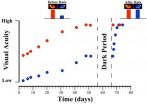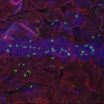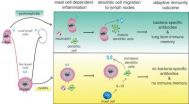(Press-News.org) Restoring vision might sometimes be as simple as turning out the lights. That's according to a study reported on February 14 in Current Biology, a Cell Press publication, in which researchers examined kittens with a visual impairment known as amblyopia before and after they spent 10 days in complete darkness.
Researchers Kevin Duffy and Donald Mitchell of Dalhousie University in Canada believe that exposure to darkness causes some parts of the visual system to revert to an early stage in development, when there is greater flexibility.
"There may be ways to increase brain plasticity and recover from disorders such as amblyopia without drug intervention," Duffy says. "Immersion in total darkness seems to reset the visual brain to enable remarkable recovery."
Amblyopia affects about four percent of the general population and is thought to develop when the two eyes do not see equally well in early life, as the connections from the eyes to visual areas in the brain are still being refined. Left untreated, that imbalance of vision can lead to permanent vision loss.
In the new study, the researchers examined kittens with amblyopia induced by experimentally depriving them of visual input to one eye. After those animals were plunged into darkness, their vision made a profound and rapid recovery. Further examination suggested that the restoration of vision depends on the loss of neurofilaments that hold the visual system in place. With those stabilizing elements gone, the visual system becomes free to correct itself.
Darkness therapy holds promise for the treatment of children with amblyopia, the researchers say, but don't try this at home. They think that the darkness must be absolute to work, with no stray light at any time. It is also important to address the original cause of the amblyopia first, and to ensure that a period of darkness will not harm an individual's good eye.
The researchers are still working out just how much darkness is required, and for how long. Regardless, they say it is unlikely that a drug could ever adequately mimic the effects of darkness that they've seen.
"The advantage of a simple nonpharmacological sensory manipulation, such as a period of darkness, is that it may initiate changes in a constellation of molecules in a beneficial temporal order and in appropriate brain regions," they write.
INFORMATION:
Current Biology, Duffy et al.: "Darkness alters maturation of visual cortex and promotes fast recovery from monocular deprivation."
Vision restored with total darkness
2013-02-14
ELSE PRESS RELEASES FROM THIS DATE:
New study of the molecular roots of recurrent bladder infections could lead to a vaccine
2013-02-14
Urinary-tract infections are the second most common bacterial infection in humans, and many of them are recurrent. A study published by Cell Press on February 14th in the journal Immunity reveals the cellular and molecular basis of recurrent bladder infections and suggests possible treatment strategies, such as vaccines, to prevent this common problem.
"Our study shows for the first time that the bladder is unable to mount an effective immune response to bacteria, which could explain the high frequency of recurrent infections," says senior study author Soman Abraham ...
Roots of language in human and bird biology
2013-02-14
BOSTON, MA -- The genes activated for human speech are similar to the ones used by singing songbirds, new experiments suggest.
These results, which are not yet published, show that gene products produced for speech in the cortical and basal ganglia regions of the human brain correspond to similar molecules in the vocal communication areas of the brains of zebra finches and budgerigars. But these molecules aren't found in the brains of doves and quails -- vocal birds that do not learn their sounds.
"The results suggest that similar behavior and neural connectivity for ...
2 Cell studies reveal genetic variation driving human evolution
2013-02-14
VIDEO:
A pair of studies published by Cell Press on February 14th in the journal Cell sheds new light on genetic variation that may have played a key role in human...
Click here for more information.
A pair of studies published by Cell Press on February 14th in the journal Cell sheds new light on genetic variation that may have played a key role in human evolution. The study researchers used an animal model to study a gene variant that could have helped humans adapt to humid ...
Bilingual babies know their grammar by 7 months
2013-02-14
Babies as young as seven months can distinguish between, and begin to learn, two languages with vastly different grammatical structures, according to new research from the University of British Columbia and Université Paris Descartes.
Published today in the journal Nature Communications and presented at the 2013 Annual Meeting of the American Association for the Advancement of Science (AAAS) in Boston, the study shows that infants in bilingual environments use pitch and duration cues to discriminate between languages – such as English and Japanese – with opposite word ...
First animal model of recent human evolution
2013-02-14
The first animal model of recent human evolution reveals that a single mutation produced several traits common in East Asian peoples, from thicker hair to denser sweat glands, an international team of researchers reports.
The team, led by researchers from Harvard Medical School, Harvard University, the Broad Institute of MIT and Harvard, Massachusetts General Hospital, Fudan University and University College London, also modeled the spread of the gene mutation across Asia and North America, concluding that it most likely arose about 30,000 years ago in what is today ...
Defect in immune memory may cause repeat bladder infections
2013-02-14
DURHAM, N.C. – Recurrent bladder infections, which are especially common among women, may result from a defect among the bladder's immune fighters that keeps them from remembering previous bacterial infections. The immune memory lapse can hamper a timely and effective attack, according to researchers at Duke Medicine and Duke-National University of Singapore.
Their study, which involved mice, may provide a new route to develop vaccines and treatments for urinary tract infections, which are the second-most common infection and account for more than 8 million health care ...
Discovery in HIV may solve efficiency problems for gene therapy
2013-02-14
A research team from Case Western Reserve University School of Medicine has discovered an approach that could make gene therapy dramatically more effective for patients.
Led by professor Eric Arts, PhD, the scientists discovered that the process of gene therapy is missing essential elements thereby reducing the effectiveness of this treatment. Re-introducing this element into their model system suggests that improvements for gene therapy areon the horizon.
The findings are detailed in the article, "A new genomic RNA packaging element in retroviruses and the interplay ...
Study tracks leukemia's genetic evolution, may help predict disease course, tailor care
2013-02-14
BOSTON AND CAMBRIDGE, Mass.––Tumors are not factories for the mass production of identical cancer cells, but are, in reality, patchworks of cells with different patterns of gene mutations. In a new study, researchers at Dana-Farber Cancer Institute and the Broad Institute show, more fully than ever before, how these mutations shift and evolve over time in chronic lymphocytic leukemia (CLL) – providing a strobe-like look at the genetic past, present, and future of CLL tumors.
Their report, which will be published online today by the journal Cell, suggests that evolution ...
Gene invaders are stymied by a cell's genome defense
2013-02-14
Gene wars rage inside our cells, with invading DNA regularly threatening to subvert our human blueprint. Now, building on Nobel-Prize-winning findings, UC San Francisco researchers have discovered a molecular machine that helps protect a cell's genes against these DNA interlopers.
The machine, named SCANR, recognizes and targets foreign DNA. The UCSF team identified it in yeast, but given the similarity of yeast and human cells, comparable mechanisms might also be found in humans, where they might serve to lower the burden of inherited human disease and death, the researchers ...
Environment schemes for kids influence parents' behavior
2013-02-14
Teaching children about the environment can affect the knowledge and behaviour of their parents, according to new research.
Scientists from Imperial College London surveyed the families of 160 schoolchildren in the Seychelles, some of whom took part in educational activities about the island's valuable wetland resources.
They found that the parents of children who took part in the wetland activities were more knowledgeable about wetlands and, were more inclined to undertake 'environmentally friendly' behaviours such as conserving water in their homes.
The findings ...






